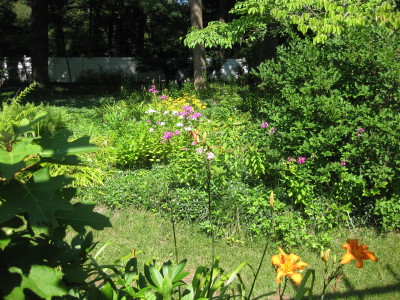
| beginning latest entry |
I wanted to start this next index page off properly, so I'm linking another of the summer-fun 'funk' pieces, just finished last week:

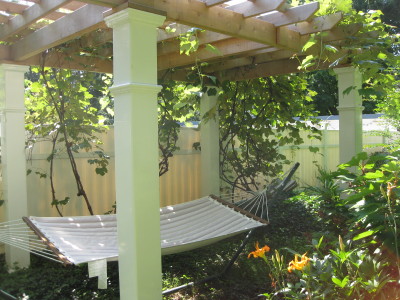
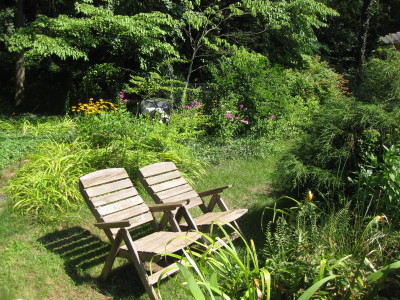
The texture of memory here is very strong. Even things like the handles on my childhood chest of drawers loom large. When you are young the immediate world is full, the totality of your experience. All kids surely have that "mindfulness" that is so valued as we get older. Our awareness shifts, it gets diluted as we age. The memories start stacking up.
I've been thinking hard about memory lately, edging into my big sabbatical project. I've been reading Eric Kandel's In Search of Memory: The Emergence of a New Science of Mind. Kandel's Nobel-prize winning fascination with his childhood memories led to his work in understanding the biology underlying memory and learning. My more mundane and selfish goal is to try to evoke the feeling of certain remembrances through music/text/image. I want to freeze memory by means of a process. Why do I want to do this? I don't know -- I guess I'm getting older.
At the same time, I feel slightly 'in stasis'. I'm working on a few things, but I haven't become truly immersed in my planned sabbatical project yet. I've been considering aspects of it, doing some basic code- and music-hacking, but I haven't found a way in to get buried in the doing of it. That will come.
In the meantime, I've been getting a few other things off my plate, some basic organizing, taking care of some medical stuff. And trying to learn some Japanese. Oh my. I'm in great shape if I need to point out a green bicycle, but that's about it right now.
Lian and Daniel are arriving home from their trip across northern Portugal and Spain tomorrow evening. Yay! This was Lian's high-school graduation gift to Daniel: "I will take you on a one-week trip anywhere you'd like to go in the world." Things like that make Jill and I really happy. It seems from the e-mails/photos we've received that they had a terrific time.
The swimming pool is shut down for the season, and I haven't started back up at the indoor Peddie school yet. Today is an absolutely gorgeous fall day, and I decided to take a walk around Roosevelt to get at least a minimal amount of exercise. Nine Inch Nails had just released a new record, their first one in about five years (and in fact something of a surprise, as Trent Reznor had said that NIN was dissolved in 2009). I hadn't had a chance to listen closely to the recording yet, so I thought: "hey, I'll crank up my iPhone and perambulate!"
I felt like a camera (I know that phrase has been said by someone before; I read it somewhere, I can't recall where). I had forgotten how listening as you walk can be strangely 'dual'. I was in the world, but also simultaneously 'in' the music. The music was all new, and it suffused the walk -- which I have done hundreds of times -- with an odd sense of newness. The sharp green of the trees against a deep blue sky, the slowly-shifting perspectives around the homes of my neighbors, strangely recast as a slow-motion movie, complete with an alienating soundtrack.
I also thought about my current memory project, trying to find a way in to a normalized working mode. I know what I want to do, but I'm struggling with the how. How do you organize a life of memories? Maybe the trick is that you don't.
And it will in fact be very different in a short time. Friday we leave for Seattle to visit Lian and Itay over the weekend, and from there we fly on Monday for our Japanese adventure. As Lian used to say when she was younger: "Daddy, what have you gotten us into this time?!?" We're getting everything all set for our sojourn. There are some minor hitches with the house/cat care, but they should all work out soon. We hope so!
Fall is just starting, and it looks like it is shaping up to be a glorious one here in New Jersey. We've had a patch of wonderful weather, those nice warm days with 'cool, crisp' nights. I snapped a few photos around our yard; the plants are just on the cusp of autumn:
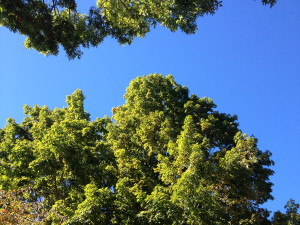


Tomorrow we leave for Japan!
The trip from Narita airport to Machida was intriguing. Along the way I recognized landmarks and street scenes I had seen on my previous trips, more than ten years ago. Combined with my jet lag, everything had that Umberto-Eco-like "hyperreality" aspect. I thought a lot about memory. Here it comes, again, but differently.
One of the things that traveling does is to take you 'out of yourself' for a time; a way of un-granting all the things you normally take for granted. Simple things like finding milk in a grocery store become acts of focused concentration. Existence is very much a Being In The Moment activity. Japan is particularly good at promoting this Zen-like feeling. Even walking around is an exercise in extended awareness -- everything is different. For those of us who can't read much of the kanji/kana, none of the signs make any sense. For those of us not from the UK, the cars are all driving on the wrong side. For those of us from New York city, people here smile and are polite without wanting something from you. It's all so strange!
But thoroughly enjoyable. We've already planned some events: a trip to stay in a ryokan in Kyoto, a private geisha performance. And the food has been wonderful. Tonight we go out to eat entirely on our own, however. God only knows what we'll get.
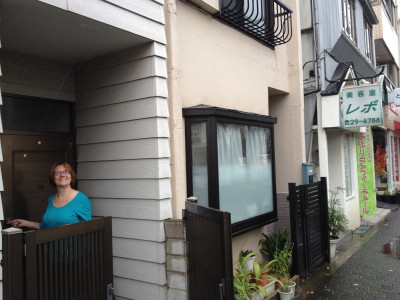
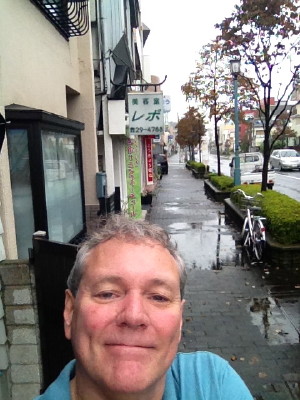
We visited two large shrines and also saw the famous "Kamakura Buddha", supposedly the largest Buddha statue in the world.
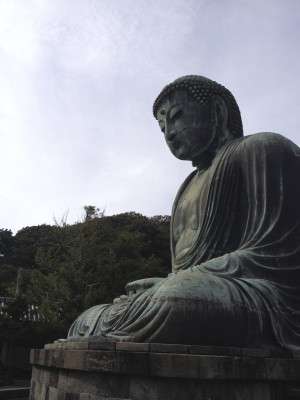
Could I do this? No. I'm too much an American pragmatist. I do want to live more in my music now, though. This is probably the place to do it. I guess I will have to, paradoxically, continue with empty watchfulness, in the hope that it will make me full.
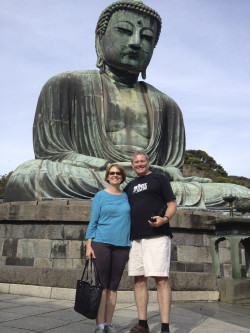
We got to re-connect with Johnathan Lee and Cathy Cox at lunchtime today, two former Columbia grads now working at Tamagawa and elsewhere. They both seemed like they hadn't aged a day -- it was good because it helped me feel young again. Time goes along, and here we are, more than a decade later. In Japan.
Jill's been posting more pictures to her Facebook page (linked above), and I've decided to take a more 'archival' approach and put most everything we've photographed on-line:
To retain some semblance of sanity, I take walks around our neighborhood. When Jill is here, we often do it together. It takes me from my virtual/mental "world" into another one just as strange. The houses, the way they are arrayed, the signage, they all conspire to produce that feeling of "otherness" that I remember from previous trips to Japan. Much more so than other places I've been. I think this may be because on the surface Japan seems very similar to home in the US. But it isn't, and the ways it differs are always surprising.
One of the goals Jill and I have set is to see Mt. Fuji. We should be able to do it from some of the higher vantage points in Tamagawa. So far it has remained elusive, even on bright and sun-sparkly days.
Waking up in the middle of the night, I had irrational worries about the storm causing leaking or flooding to our home in Roosevelt. The ties of home are strong, even though we're having a delicious time here. Tomorrow we travel to Hakone for a stay in a ryokan: Yutorelo-an.
I put some more photos on-line:
We've been doing well in negotiating Japan. Our trip to Hakone was amazing, and our timing was excellent. The heavy rains/typhoon moved in the day after we returned. We had partial sun and clouds, no rain to speak of, the whole time we were in the mountains. We had some spectacular views of Mt. Fuji. More pictures on-line here:
The Kyoto screen exhibition, though, generated one of those "epiphany" moments for me. First of all, while looking at the way life was depicted on the early screens, sort of a cross between a map and one of those paintings crammed-full of people doing things, I got an excellent idea about how to set up the entry-point for my book project. Then while seeing more of the pictures, the whole layout of the project just seemed to snap into place. It almost knocked me over, it all made sense! Although I've been doing well with the underlying programming and technical aspects to do what I need to do, I had been wrestling with how the "book" would present itself. Looking at these stunning screens, I could suddenly imagine how it all would work. Yeah, even in abstraction it is bald-faced stealing for sure, but at least I'm stealing from a venerable source. I told Jill later that this seems that sort of thing that should happen on a sabbatical, so I guess we're doing the right stuff.
One of the things that struck me (just one of many) about the screens was how much they operated on what western-people like me would call the 'surface' of the artwork. We get so wrapped up in a construction of 'deep' unity in our western aesthetics (the music theorizing of Schenker, for example) that the surface is generally dismissed as a shallow part -- oh the metaphors -- of our perception. It's always the unfolding of some underlying structure that makes Great Art.
The Kyoto screens had very little of that, and the overall, unified form that was present came from the interaction of all the surface characteristics, or it was borrowed from a natural model. It wasn't some tangled opening-out of a foundational idea that drove the art. The surface elements were privileged, not denigrated as a kind of window-dressing for the real fundamental material.
At least that was my take on them. I've always maintained that I'm a surface kind-of-guy, and these screens really got me. The statement that they "almost knocked me over" above is totally accurate. I had to go sit down, the experience was so overwhelming. Not bad for a rainy Sunday afternoon in Tokyo. Now we have another typhoon approaching later this week.
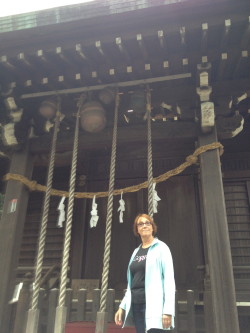
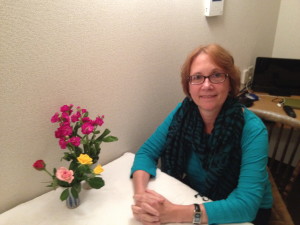
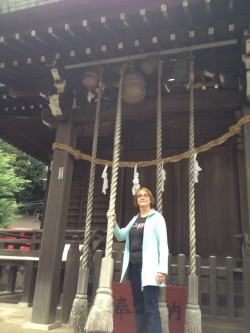
It was also raining and blowing hard all night, the effects of not one but two(!) typhoons off the eastern coast. Fortunately they had moved farther out to sea, so the effects weren't even as bad as the typhoon we had here last week.
My goodness! Typhoons, earthquakes... but we're getting along well. The food has been amazing, even the take-home stuff we pick up in the grocery store ("soo-pah" in Japanese). The soo-pah sushi is as good or better than what we get in good Japanese restaurants back home. And much less expensive. Jill has also become very adept at identifying foods when she goes shopping. We've had several delicious "home cooked" meals here. Have I said before I am a lucky guy? I am.
One of the tricky things that we're still learning is the recycling insanity. "Insanity" is not an exaggeration: every single day of the week is a trash/recycling pickup day for various different categories of refuse. Things go into color-coded bags depending on what they are. Some recyclable items, however, need to be placed in special bins that are placed on street corners the night before that particular category of material is due to be picked up, and others need to be taken back to special bins outside the local grocery stores or the 7-11.
[note: 7-11 stores have an exceptional status here in Japan. They became our de-facto bank after we discovered that it was impossible (yeah...) to transfer money from our bank to a bank account here in Japan. The 7-11 stores were the only places we could find where our bank cards worked in an ATM. This is not unusual. Our friends Johnathan and Cathy told us that 7-11s in Japan even offer insurance policies. Convenience store, indeed.]
Jill has posted pictures of the disposal instructions Facebook page (click through the pictures -- they are only a few of the 10+ pages in the booklet!). How did we get these instructions to learn the recycling arcana? We had been trying to sneak along by imitating our neighbors, putting out green bags when we noticed others along the street, yellow bags on yellow-bag day, but we could not sustain the deception. An older Japanese gentleman who lives/works next door to us had noticed that we had the wrong stuff in our green bags. As we were leaving to go out, he came over and started explaining to us -- in Japanese of course -- the proper way to use the bags. I used my handy "Sumimasen, Nihongo ga wakarimasen" phrase ("I am sorry, I don't understand Japanese"), and I got to experience what many foreigners traveling the in the US experience: He repeated what he was saying, in Japanese, only a little slower and more loudly. Jill and I were totally befuddled.
About the third or fourth time he was patiently explaining to us what to do (I think at this point he had opened one of our bags and was separating various items for us), a younger Japanese guy came along who spoke a little English. He helped explain some of what we should be doing, but it was impossible (see the photos on Jill's FB page) to cover the massive Recycling Code in toto. We managed to come to some kind of stopping point with the current bag situation, so we said our thank-yous and headed down the street.
Two blocks from the train station, a person on a motor scooter drove up to accost us, brandishing some published materials in his hand. I thought it was probably one of the Japanese street advertisers or a religious proselytizer, so I was quick to start my "no, thank you, don't understand Japanese" routine when we noticed it was the nice young guy from before. He apparently ran back to his house, got his scooter, went to the local municipal building and found all the recycling instructions in English for us, and then chased us down. Jeez, that takes my breath away. Japanese society, like all human constructions, certainly has it's share of problems. Lack of politeness, helpfulness or human decency aren't among them. So now we know, sort-of, what waste to put out and when. We're in trouble if we need to disposed of any bowling balls or pianos, though.
There was also an interesting 'small world' aspect to the afternoon: While conversing with the helpful young guy about our recycling puzzlement, I explained in half-Japanese/half-English that I was here visiting friends at Tamagawa, and was a music professor from the US. It turns out that his grandfather wrote the Tamagawa University school song.
The real experience, though, and the reason we were in Shibuya was to attend a Noh performance that evening. What can I say? It was stunning. Akira had arranged the ticket reservations for us and had also sent along a link about Noh and the outline of the Noh story we were to see. The text Akira sent is on JSTOR, so access is limited. I did find this link to the story of Akogi, the Noh play we attended.
In addition to the Noh play, the evening featured two dances and one short comedy ("Kyogen"). The Kyogen was actually very funny, an odd story about two lesser nobles who get their hats stuck together (you have to see it...). Both the two dances and the entire Noh play seemed very contemporary to Jill and me, like seeing a VERY well-done avant garde performance. Akira speculated at dinner tonight that the reason we had this feeling is because of the high degree of abstraction inherent in a Noh performance. For me this makes sense -- the slowly unfolding and repetitive music/movements, the strong sense of 'otherness', the highly symbolic aspect of particular features, these are all characteristics I can map onto modern performances that have left a deep impression on me. Needless to say, the Noh performance did.
Walking back out into Shibuya that evening was like a continuation of that alien feeling. People, people, in outlandish fashions and costumes (Halloween has apparently been taking over Japan the past few years), it was all very, very strange. We went home and discovered that one of the TV channels was showing non-stop Noh. We watched most of one more play, and part of another. All the Noh, all the time!
Over the weekend we traveled again to the Izu peninsula. I say "again"
because we stayed at a ryokan there almost exactly twenty years ago.
Lian was just beginning first grade, and we have many family memories
that came from that particular trip (the monkey, the "Hi Daddy!" the
"Daddy, WHAT have you gotten us into THIS time?!?" stories...).
It was beautiful, and the food was astounding. I'm running out of
superlatives to describe things! Yikes, I simply list
things we've done -- hot spring baths, a 1200-year-old shrine at the
base of Mt. Fuji, hikes around volcanic forms on the western Izu
coast -- and life seems practically unbelievable. Our good friend
Gregory Taylor
is visiting. It's nice to be able to share all this with someone.
But a lot has been happening. As Jill wrote to my mother this morning: "another grueling day of fun!" Gregory Taylor left yesterday, and we do miss his running commentary/appreciation for the things we're discovering here. There were many times of laughter (especially the TV special on the wild boar problem in central Japan). We'll have more, I am certain.
Jill wrote this in e-mail to the family after our visit to the Kabuki theater, so I thought I'd just quote it here for the record. She wrote it earlier this week, so the references to "last night" refer to a few nights ago:
The performance was amazing. The story was like a soap opera set in the 1760's, complete with a 20 minute fight scene in the snow as the ending. All of the actors were men, even the ones portraying the concubine who had sold herself to finance her husband's participation in a vendetta against his rival Samurai. There were sword fights, sake drinking, people falling through trap doors on the stage - all kinds of theatrical stunts.
The evening discussion was an opportunity for Sayuki to request that Brad find a way to bring her to the states so she could teach geisha studies in a Japanese Cultural center. Quite interesting. She is an amazing woman. The maiko (geisha in training) was dressed in a kimono of her mothers - gorgeous!!! And the three students were dressed in student garb. Fun.
2. "Hi Daddy!" -- When we first arrived at our ryokan during that trip, Akira and I planned to meet in the ryokan's hot-springs bath. Lian absolutely loved these baths, so she and Jill went to the women's baths at the same time. I arrived before Akira, and was sitting in the men's bath enjoying the soak. There were several very serious-looking Japanese gentleman in the bath with me. As I relaxed, I heard a little voice call out "HI DADDY!" from a short distance up the hill. Lian was leaning over the edge of the women's bath, waving and smiling. I wasn't quite sure what to do -- I mean there were serious Japanese businessmen in the bath with me! As discretely as possible, I waved back, and then noticed that all the Japanese with me were laughing. All was good.
3. "Daddy, WHAT have you gotten us into THIS time?!?" -- In the ryokan, they brought our food to us in our room (this is the custom for good Japanese ryokans). The food was extremely elegant, very well-done Japanese cuisine. However, to western senses, it was very different from our standard palate. Jill, Lian and I (Daniel wasn't born yet, and I have a whole host of stories about his trips to Japan, for another time) were dressed in our yukatas, and after the hostess had set up the meal and left the room, Lian began parading around, circling the food in the middle of the room, chanting (you guessed it) "Daddy, WHAT have you gotten us into THIS time?!?" Ever since then it has become a recurring family theme. For obvious reasons.
One final comment I wanted to write here: My Japanese is marginally improving, although it is quite comical most of the time. I keep trying! Early on in our stay, I told Jill that it might be fun to pretend I'm a random Zen monk-teacher, and memorize some lines like "the cat is purple" or "drive the sky to electricity" and throw them in to conversations with people. She pointed out that people would just think I was strange, or stupid, or strangely stupid. I did, however, learn a few things I could say that I hoped would convey my happiness at being a guest here, things like "Excellent!" ("sugureta!") and "This is delicious!" ("moto oishi desu!") I think I wound up being a strange person in any case, because one of the phrases I learned was "seikatsu wa kaitekidesu!" which I think means "life is good!". I tried it a few times and evoked the appropriate response (shades of Wittgensteinian language-games...): smiles, nods of "yes! yes!" and a general congeniality. However, I inadvertently began mis-pronouncing part of the phrase, and I noticed that people would still smile, and nod "yes", but their response was a bit more guarded. We had dinner with a good friend of Gregory's (Christine) who has lived in Japan for almost 40 years. She speaks fluently, of course, and when I tried my life-is-good phrase out on her, she asked me what I thought I was saying. She laughed and said that the altered pronunciation had changed the sentence. Instead of telling people about life and goodness, I was leaving them with the profound thought: "Cleaning is good!" That explained a lot.
We spent a marvelous two-and-a-half days in Kyoto and Nara, and we just returned from a great trip (marvelous! great!) to Akira's family cabin in Nagano prefecture. We rode the Shinkansen (bullet train), we went to outlandish malls in Tokyo, we saw Imperial things, we've eaten amazing food, sipped some oishi-desu (excellent tasting) sake, taken nice walks, met with good friends, made some new friends, LIAN was here for a weekend visit (and then she got busy with Amazon stuff; she's back in Seattle now), we skype when we can with Daniel (he's slogging through his sophomore year). Too much! All good!
Here are several sets of the photos we've taken:
Tomorrow we're going on one last weekend-away trip with Akira to visit the shogun shrines at Nikko and make one last stop (for Jill) at the Mashiko "pottery village". When we return, we'll begin the process of packing up our lives for the return to the US.
What a visit this has been! I think I've said this before in this blog, or at least it should be apparent from my breathless/purplish prose, but this trip could not have gone better. We've seen amazing sights/sites, I think I've made some good contacts for future collaborative work, and I've managed to get a really good amount of work done on my sabbatical book-project. Jill has really enjoyed it, too, and I think the exit from NJ for a time in order to think about her personal future was perfect.
We wonder about our house, about Lian, Daniel, the family, friends, the cat. Soon we will be back in the swing of life, back home. Japan will be a set of powerful memories, with hopefully a strong future attached to them. How lucky we have been!
On the way home, I was thinking about two experiences I had in Nikko:
1. In the Kanaya Hotel gift shop as we were checking out, I was enjoying a display of cute stuffed cats, also seeing various other smiling things around me, and I was really struck by something that is hard not to notice here in Japan: the relentless drive to be happy. I'm not using quotes around the word "happy", because it is an authentic quest. Often it manifests as an over-the-top kitschy cuteness, but it also appears as a genuine friendliness from most everyone we have encountered here. It doesn't seem 'put on' at all, the way it often can when you are in the role of tourist, with money. People are truly nice.
Underlying this pursuit of happiness, however, is a cultural depression deriving from the massive workload and social constrictions that surround a Japanese citizen. I see this most nakedly in the creative friends we have here. When I see the happiness failing, I am overwhelmed by an intense sort of poignancy. Please, be happy! I hope you can! The kitschiness becomes noble in a weird way. I think of the last few lines I wrote in My Book of Dreams:
It turns out that the 'abyss' is a gorge with a river running through it, not even that deep. But it was very lovely. While hiking along the trail, a gust of wind caused a bunch of leaves to fall around us. I tried to catch a photo of it, but my iPhone camera had locked again so I missed it. Here I write the memory of it, though, the multicolored leaves coming down, the three-dimensionality of them, the sense of change again. We're about to head home. It is fall.
The direct pleasure I took in that sensation seemed in contrast with something I had read earlier in the morning. In Japan, the Gideons have attempted to do their "leave the New Testament" thing in the hotels where we have stayed, but they are up against some eastern Gideons who also leave "The Teachings of Buddha" in the rooms. Nice!
I had been leafing through the "Buddha" book before our walk to the abyss (isn't that fun to say?), and I happened upon one of the standard tenets of the religion: how perceived reality is an illusion, a mask that hides the true universal consciousness. The metaphor given in this particular passage was one I'd heard before -- water is round in a round container, square in a square container, but what sense is there to ask about the shape of water? The surface of the reality we apprehend is false. It leads us away from true understanding.
This seems a common feature of mystical experience, even in western religions. Even our advanced theoretical thinking always aims for an underlying unity, a way to bind everything to a deeper coherence. The leaves falling at the abyss tell a different story to me. This story was echoed later in the day, as we were driving home from the pottery-village of Mashiko. We were in the hills outside the town, dusk was beginning, and the muted colors of the trees were very, very beautiful. I said to Jill and Akira: "you can't capture this in a photo." Jill replied: "We'll have to carry the memory of this moment."
And that's it. I love the surface nature of things! It is actually the mask of reality that I enjoy, the way that each moment we live can be uniquely wonderful. It isn't something I want to jettison or see-through. It is the essence and the joy of life for me. I don't want to see the falseness of my reality. It is already sublime.
I guess the question I might have, reading and trying to understand the mystical mind: how to reconcile the experience of universal unity (which is pretty cool, to be sure) with the surface of reality that I adore? My answer might be the recognition that one-ness is an individual experience, another private phenomenon we inhabit. One-ness for one, please.
When it came our turn in the check-out line, I smoothly asked the young man at the counter: "Kurejittokado?" ("credit-o-card-o"?), the tricky Japanese expression for "do you take credit cards?" He answered yes, so I handed him my Master Card for payment. At that point, he asked me something else in Japanese, a request that was utterly opaque to me. I signaled that I did not understand, so he repeated the phrase, pointing to my Master Card, and taking the time to write down -- in Japanese -- his query for information. Was it the expiration date? Did he want the name of our bank? Our home address? The names of our children? Jill and I were both completely clueless Americans.
Finally I restored to something I haven't done during our stay here. I got out my trusty iPhone, fired up the Google Translate app, and gestured to the cashier that he should ask his question of my iPhone. Google Translate will theoretically take 'live' spoken text and do the translation. My phone informed me that the young man was saying "Payment method is cold."
What could that cryptic statement mean? I pointed again to the expiration date (which was not until 2016 according to the plastic numbers etched on the card). No, that wasn't it. The clerk asked for my phone again, repeated the question, but more slowly, and Google came up with "Payment method. Bulk." Still not completely sure what this might actually mean, I decided to cut my losses and said enthusiastically "HAI!" (i.e. "YES!"). He happily took my card, charged the purchase, and we had our larger suitcase.
On the way back to Tamagawa, Jill asked me if I had tried using the speech-to-text feature of my phone to translate any of the random Japanese phrases I've been using to spice up our interactions with people here. I hadn't, but just for fun I attempted a few. One of my favorites, very useful when finishing a great meal to signal happiness to the chef, server, and various other Japanese hanging around to gawk at the gaijins, was "Seikatsu wa kaitekidesu". I spoke it into the phone, and it did come back with "Life is good", which is what I had hoped I was saying. I've been told it's a very strange grammatical construction of the phrase, although I can't imagine Google Translate doing something weird with language.
Then I tried "watachi-wa Nihongo ga warui desu!", which should have translated as "my Japanese is very bad!". I forgot when I said it that I should have used a possessive particle ("watachi-no" instead of "watachi-wa") so the translation said "I am a bad Japanese!" I wonder how many people I have warned about this.
Next I tried another good one, usually accompanied by my pointing to Jill: "watachi-no tsuma desu" (note the correct use of the possessive "-no" particle), which should have meant "this is my wife". Sometimes I throw in a random "sobarashi tsuma", meaning (I hope) my "excellent wife". The translation? "This is my wifey". Jill was not amused.
But the one that totally broke us down into tears of laughter was one I knew was incorrect, but not so completely wrong. When Lian was visiting, I would tell people proudly "watashi-no musume AMAZON desu!" My intent is to signal that my daughter worked for Amazon. My suspicion was that I was saying "my daughter IS Amazon." I was way off the mark, apparently. Google wrote in response to my statement: "My daughter is the first range of mountains!"
Sigh. I'll keep trying. I have a loooong way to go. At least people here enjoy the comedy.
Here is one last big group of photos,from our trip to Nikko and various events before and after:
This was the longest Jill and I have been away. Coming back was strange, mainly because so much here seems relatively unchanged. At the same time, however, we have changed. We're still digesting the experiences we had in Japan -- so many! All the memories, the new paths open to us. The future. Homecoming has been made even stranger because of Jill's new status in life. Where will we be this time next year? I know for sure that predictions can be radically incorrect. It makes the travel through time so... interesting.
Here are the final photos we took while in Japan:
We went up to New York yesterday to have dinner with Daniel and visit our apartment. Just before we left, it started to snow:
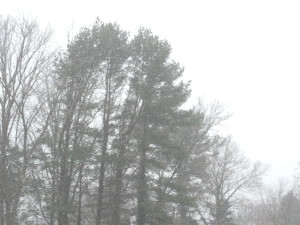

I also got our Christmas lights up:
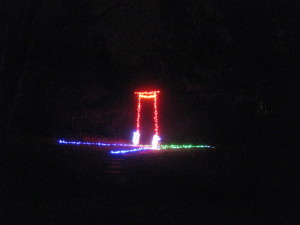
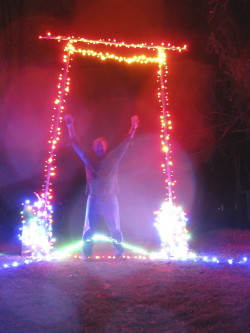
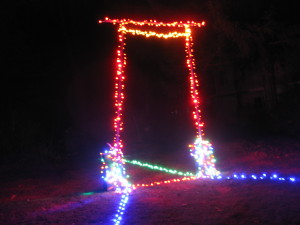
That knowledge seeps into my sense of reality, coloring it in a way that suggests: yes, this is how it will be! Hopefully by now I know better, but I'm not so sure. It is so easy to imagine the Christmas Eve here next year, the next ten years. They will all be like this, like the past. Wonderful. World without end. Lian and Daniel are home. Their lives are taking off. Jill is now retired, and we're rediscovering why we fell in love thirty years ago (or at least I think we are!). Our trees are magical again, and the outside lights are nicely evocative of our recent life.
I have again been not writing as much here as I probably should. I use this blog a lot to remind myself of how things can go. As excuses I offer:
1. I've been writing a lot for my sabbatical book-thing. I'm nearly finished with the first pass of text. Now comes the revising and music-grafting. I think I'm on schedule. Writing this blog after a day of reporting things I remember seems strangely redundant.
2. I don't have Exciting Things to report. That's good! What I can do instead is say I'm settled in for my Christmas Eve traditions. I finish the packaging, I shoot pictures of the trees, I sip some Amaretto and I will listen to Byzantine Monks sing hymns of Christmas Eve. And I pretend that I know the future, and it is a lot like this. Merry Christmas!
Here are a few others I wanted to get done today:



